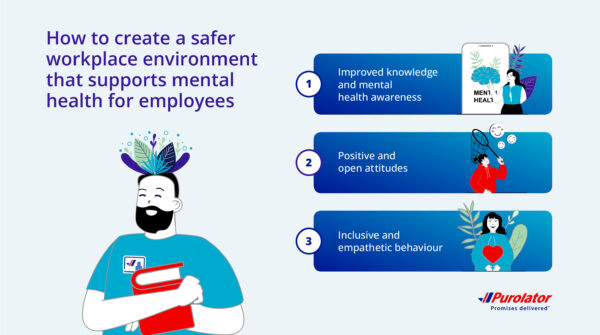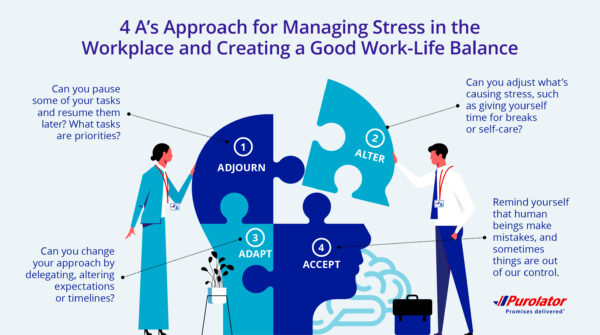Mental health is a cornerstone in supporting the overall health of individuals and communities. One in two Canadians experience a mental illness by the age of 40, and in any given year, one in five Canadians experience a mental illness (CAMH). Observed during the month of May, Mental Health Awareness Week aims to destigmatize, raise awareness, and support individuals struggling with mental health through empathetic, unified initiatives.
As part of Purolator’s unwavering commitment to building awareness of holistic health and providing support to our employees and the communities we serve, we’ve partnered with Cleveland Clinic Canada since 2020 to launch ongoing mental health initiatives and programs like Purolator Health. For Mental Health Awareness Week, Purolator sat down with general and forensic psychiatrist Dr. Andrew Morgan, from the Cleveland Clinic Canada, to get his expertise on strategies, techniques, and tools for supporting mental health in the workplace. Read on to learn more and watch the full webcast here.
How can we foster a supportive and stigma-free environment for mental health discussions?
Stigma is the primary obstacle for those experiencing a mental illness. Creating a stigma-free and supportive workplace for mental health discussions brings many benefits for small-medium businesses. These include: improved employee performance, greater job satisfaction and retention, increased trust in the company and its leaders, and a deeper sense of pride in their work.
When it comes to creating a better, safer workplace that supports mental health for employees, Dr. Andrew Morgan recommends starting with foundational changes such as:
- Improved knowledge and mental health awareness
- Positive and open attitudes
- Inclusive and empathetic behaviour
A supportive and stigma-free environment starts with open discussions about workplace mental health. Here are some ideas from Dr. Morgan to help you get started:
- Host educational sessions about mental health issues and their impacts.
- Provide support to colleagues that you notice may be struggling with a mental health issue through private conversations, empathetic listening, and sharing of resources.
- Share your own experiences, if you feel comfortable. This is especially helpful if you’re in a leadership position.
While this is not an exhaustive list, these strategies can form the foundation for a culture of mental wellness.
What are some practical strategies for managing stress and maintaining work-life balance in a small business environment?
Stress is a normal and unavoidable part of work, and can sometimes be beneficial by helping to motivate and develop focus. However, when stress becomes too high, it can be disorienting, draining, and impacts productivity. In fact, 50 percent of SMBs say that stress and mental health issues are impacting their business’s success.
Dr. Morgan’s practical strategies for managing stress in the workplace and creating a good work-life balance include analyzing work through the 4 A’s Approach, which can provide a structure for focusing time on recharging our mental energy:
- Adjourn: Can you pause some of your tasks and resume them later? What tasks are priorities?
- Alter: Can you adjust what’s causing stress, such as giving yourself time for breaks or self-care?
- Adapt: Can you change your approach by delegating, altering expectations or timelines?
- Accept: Remind yourself that human beings make mistakes, and sometimes things are out of our control.
Investing in managing stress and supporting better work-life balance for employees brings many benefits for small businesses including increased creativity, innovation, diversity, productivity, and employee retention, with 80 percent of employees saying they would be more loyal to an employer providing flexible working hours.
What are some effective techniques for coping with or avoiding burnout in a small business setting?
Burnout is one of the key challenges facing small business owners. In fact, a recent survey showed that 66 percent of small business owners have either experienced burnout in the past month or are currently experiencing burnout.
Dr. Morgan suggests these techniques for coping with or avoiding burnout in a small business setting:
Commit to good self-care practices. Establish boundaries for your working hours. Get enough sleep, exercise, and time with people you care about, and make sure you eat well.
Re-evaluate your organizational culture. If your employees are experiencing high levels of burnout, you may want to examine these six organizational factors:
- How does your workload management take employee capacity into consideration?
- Do employees have enough autonomy and resources?
- Are you rewarding and recognizing achievement?
- Do employees feel part of a unified community working towards clear objectives?
- Is there fair treatment with balanced responsibilities and realistic goals?
- Can people complete work that aligns with both individual employee and organizational values?
Burnout affects not only the health of individuals in your small business, but the health of your business as a whole. Focus on long-term, sustainable approaches that create an environment where your employees feel safe and heard, and promote mental health awareness.
Supporting Mental Health into the Future
Creating a working environment that promotes mental health awareness and supports the wellbeing of your employees takes commitment and careful, ongoing work. The key is staying compassionate and listening to the needs of your staff, and having the readiness to evolve with ongoing changes.
To learn more about how small businesses are spearheading mental wellness in the workplace, watch the video.
Disclaimer: All content and information in this article is for informational and educational purposes only and does not constitute medical advice. Your use of this article does not establish any kind of patient-client relationship.
Please consult a qualified healthcare provider with any questions you may have about your health, a medical condition or treatment. Purolator makes no representation or warranty of any kind, express or implied, regarding the accuracy, adequacy, reliability or completeness of the information in this article, and disclaims any liability related to the use of, or reliance upon, such information.
Dr. Andrew Morgan, MD, FRCPCGeneral and Forensic Psychiatrist at Cleveland Clinic Canada
Dr. Andrew Morgan, MD, FRCPC, is a General and Forensic Psychiatrist at Cleveland Clinic Canada, treating patients with conditions related to mood, anxiety, and trauma as well as schizophrenia. He has an interest in the relationship between mental health and the law.



